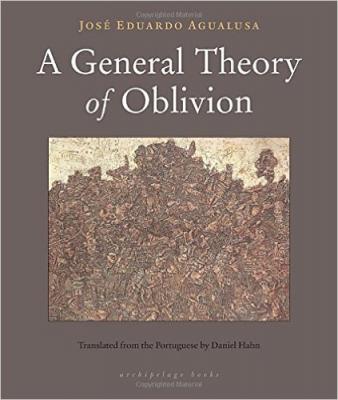After achieving its independence from Portugal in 1975, Angola slipped into a 27-year period of civil war between two former liberation movements, Marxist-Leninist and anti-communist respectively. The debacle was also a proxy war between the Soviets and Americans, with Cuban militants and South African detachments thrown in the mix.
 José Eduardo Agualusa’s 2012 novel, A General Theory of Oblivion (Teoria Geral do Esquecimento), reflects on this violent time. On the eve of independence, Ludovica Fernandes Mano, a Portuguese émigré who followed her married sister to Angola, barricades herself within a high-rise penthouse with a terrace garden. Habitually fearful, Ludo remains there for 28 years. She keeps a diary, writes poems, and draws charcoal pictures on her walls. On her death in 2010, she is 85 years old.
José Eduardo Agualusa’s 2012 novel, A General Theory of Oblivion (Teoria Geral do Esquecimento), reflects on this violent time. On the eve of independence, Ludovica Fernandes Mano, a Portuguese émigré who followed her married sister to Angola, barricades herself within a high-rise penthouse with a terrace garden. Habitually fearful, Ludo remains there for 28 years. She keeps a diary, writes poems, and draws charcoal pictures on her walls. On her death in 2010, she is 85 years old.
Although the unnamed narrator ventures far beyond her walls to other characters and events in Luanda and the countryside, Ludo’s barriers establish the novel’s attitude and gesture: this story is itself an enclosure, asserting its own strange vitality in the midst of a history that wills only its own will. Although Angola’s wars have barely ended, Agualusa’s terse detachment suggests a long view. He is interested only in the human enigma that hides behind ideology.
 Through spare, laconic prose, Agualusa capably produces a menacing and menaced cast of characters: Magno Moreira Monte, a murderous intelligence agent; Little Chief, an ex-prisoner turned entrepreneur and landlord; and Daniel Benchimol, a journalist with a keen interest in people and things that disappear. Many others appear – such as a thieving street urchin who manages to climb up to Ludo’s apartment. There are street toughs, poets, entertainers, mercenaries, and tribal peoples. In a fine twist at the end, the retired Monte plans “to spend his final years rereading Jorge Amado, Machado de Assis, Clarice Lispector, Luandino Vieira, Ruy Duarte de Carvalho, Julio Cortazar, Gabriel Garcia Marquez.” Agualusa’s artistry, fed by these forebears, enacts the sound and shape of antidote to bloodlust and domination – a turn from conventional group behavior to the radical strangeness of the individual.
Through spare, laconic prose, Agualusa capably produces a menacing and menaced cast of characters: Magno Moreira Monte, a murderous intelligence agent; Little Chief, an ex-prisoner turned entrepreneur and landlord; and Daniel Benchimol, a journalist with a keen interest in people and things that disappear. Many others appear – such as a thieving street urchin who manages to climb up to Ludo’s apartment. There are street toughs, poets, entertainers, mercenaries, and tribal peoples. In a fine twist at the end, the retired Monte plans “to spend his final years rereading Jorge Amado, Machado de Assis, Clarice Lispector, Luandino Vieira, Ruy Duarte de Carvalho, Julio Cortazar, Gabriel Garcia Marquez.” Agualusa’s artistry, fed by these forebears, enacts the sound and shape of antidote to bloodlust and domination – a turn from conventional group behavior to the radical strangeness of the individual.
In 37 brief chapters, Agualusa weaves together Angolan folklore and philosophical asides, the fateful stories of individual oppressive and oppressed people, and eccentric narratives of chance, survival and death. Even Baiacu, a “street businessman,” interrupts his chicanery to expound his views: “The truth is the soleless shoe of a man who doesn’t know how to lie.” These strands and layered tales entwine effortlessly. As the reader learns more about the Angolan tragedy, Ludo drifts away from it even as she lives at its center, losing her eyesight, yet recording her impressions with exemplary and piercing honesty. She writes:
If I still had the space, charcoal, and available walls,
I could compose a great work about forgetting:
A general theory of oblivion.
I realize I have transformed the entire apartment into a huge book. After burning the library, after I have died, all that remains will be my voice.
In this house all the walls have my mouth.
Agualusa’s succinctness has, in part, a stricken vein, a sober sense of its limits that aligns with Ludo’s and Angola’s stricken situation. You can hear it in this opening paragraph from “Apparitions, and a Nearly Fatal Fall”:
 “November passed, cloudless. December too. February arrived and the air was cracked with thirst. Ludo saw the lagoon drying out. First it darkened, then the grass turned gold, almost white, and the nighttimes lost the uproarious noise of the frogs. The woman counted the bottles of water. Not many left. The chickens, to which she gave the muddy waster from the swimming pool to drink, fell sick. They all died. There was still corn left, and beans, but to cook them used up a lot of water, and she needed to save it.”
“November passed, cloudless. December too. February arrived and the air was cracked with thirst. Ludo saw the lagoon drying out. First it darkened, then the grass turned gold, almost white, and the nighttimes lost the uproarious noise of the frogs. The woman counted the bottles of water. Not many left. The chickens, to which she gave the muddy waster from the swimming pool to drink, fell sick. They all died. There was still corn left, and beans, but to cook them used up a lot of water, and she needed to save it.”
Agualusa allows a whiff of magical realism to drift in – but restrains its antic nature. Although A General Theory of Oblivion never skirts the density of the “real” and its historical base, the novel’s underlying obsession is with the power of stories – revisions of history for the sake of power versus fragmented, pained efforts to illuminate the other side of life. This is the ongoing struggle. The oblivion may be a tireless force or condition — but it fails to make us oblivious.
In 2007, Agualusa and Daniel Hahn, his translator, received the Independent Foreign Fiction Prize for The Book of Chameleons. Although he has written 13 novels and collections of short stories, Agualusa is just now drawing the attention of Anglophone readers, taking his deserved place as a major African lusophone writer. In an afterword, he mentions that this novel emerged from a screenplay he wrote in 2004 about a woman who bricks herself into her apartment. The film was never shot – but I’m grateful that Agualusa persisted to give us this charmed and charming novel.
[Published by Archipelago Books on December 15, 2015. 250 pages, $18.00 paperback]